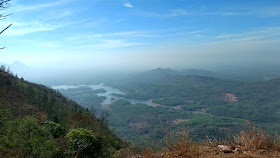Kurisumala Pilgrim Centre, Kanyakumari
Kurisumala
is one of the most prominent Christian Pilgrim Centers in South India. It is
situated in Kanyakumari District of Tamilnadu, under the Diocese of
Neyyattinkara. The word Kurisumala literally means Mount of the Cross. The
mountain is much steeper so climbing up is a little tough task for pilgrims. It
lies about three thousand feet (more than 900 m) above the sea level on the
Western Ghats.
The
scenic beauty and serenity make this mount most suited for prayer meditation
and God experience. It is on the fringes of Thiruvananthapuram and Kanyakumari
districts adjacent to the Kerala Tamilnadu border. Singing, chanting prayers
and taking temporary recess at each of the fourteen Stations pilgrims
commemorate the journey of Christ to Golgotha. The devotees while climbing the
mount experience the healing touch of God.
A good
number of pilgrims get relief from torments, heart breaking thoughts and
emotional crisis. The scenic beauty and serenity make this mount most suited
for prayer, meditation and God experience. More than 40 lakh people,
irrespective of the caste, creed or religion undertake this holy pilgrimage
every year. This place is also called as Thekkan Kurisumala.
History
Five
decades ago Kurisumala was known as 'Kondaketty Mala'. The history of
Kurisumala can be traced back to 1940s. The humble farmers, George and Esthron
resided in a cave on the summit and experienced the wonders and healing power
of the Cross. On 27th March 1957 Fr. John Baptist OCD, a Belgium missionary
climbed the summit with a small group of parishners and established a wooden
Cross. That marked the beginning of the pilgrimage. The Cross on the summit has
a history of its own. Due to bad weather the wooden Cross was partially
damaged. Therefore a 24 feet (7m) high concrete Cross was established in its
place.
In the
1980s the 14 Stations of the Cross were erected. In 1984 it was declared the
official Pilgrim Centre by Rt. Rev. Dr. Jacob Acharuparambil, Bishop of
Trivandrum Diocese. With the bifurcation of Trivandrum Diocese, Kurisumala
became part of the Diocese of Neyyattinkara. Because of the untiring efforts of
many priests, religious and lay people further developments were brought about.
In 'Sangamavedi' (the meeting place) the Holy Altar, the Shrines of Pieta and
Gethsamane were built.
Kurisumala
Pilgrim Centre
The
journey to 'Neruka', the summit of the mount, is very strenuous. The path is
narrow, stony and dusty winding through steep rocks.
1. The Sangamavedi (Meeting place):
It is at
the foot of the hill where all pilgrims gather before they start their journey
to 'Neruka'. Here we find a Holy Altar, Shrine of Pieta and Shrine of
Gethsemane.
2. Shrine of Gethsemane:
The
Shrine at Sangamavedi, founded on a small hill, catching the sight of the Cross
at 'Neruka'. The figure of Christ praying in the garden of Gethsemane reminds
the pilgrims of Christ's words "Keep watch and pray that you will not fall
into temptation". From here one learns the need for self-surrender in life
and proceeds the journey to the 'Neruka'.
3. Shrine of Pieta:
Pieta is
one of the most attractive shrines in Sangamavedi, it stands facing the Holy
Altar. The Shrine of Pieta makes all pilgrims meditative and they forget their
worries on seeing the sculpture of Virgin Mary holding the body of Jesus
Christ.
4. Statue of Rev. Fr. John Baptist. OCD (Father of
Kurisumala):
The
Statue of Rev. Fr. John Baptist. OCD (Father of Kurisumala) is stands in the
nearest of Shrine of Gethsemane. Rev. Fr. John Baptist. OCD was born in Belgium
on 1904. After his primary education, he joined the Carmelite Order on 1927. He
was ordained a priest on 1934. He left Belgium after one year of priestly
service. He came to Travancore on 1935 as a missionary. From 1939 to 1973, he
continued his zealous missionary work. On March 27th, 1957, he erected the
Cross at the zenith of Kondaketty which came the beginning of the Kurisumala
Pilgrimage.
5. Spot for rest:
It is
the place beside the fifth station of the Cross on the way to 'Neruka'. The
pilgrims can enjoy cool breeze under the shade of trees. After the rest, then
proceed their journey to 'Neruka'.
6. The Last Supper in Rock:
The
famous paint “The Last Supper” is painted in the
rock near the way of journey to Neruka.
7. 14 Stations Pilgrims:
Singing,
chanting prayers and taking temporary recess at each of fourteen stations
pilgrims commemorate the journey of Christ to Golgotha.
8. Neruka:
Neruka
is the abode of the Cross on the summit. The whole atmosphere gives the
pilgrims a deep experience of the presence of God. It is the destination of all
pilgrims. The view of the surrounding valley and the horizon from 'Neruka' is
enchanting and it holds the pilgrims spellbound.
Contact
Diocese
of Neyyattinkara,
Bishop's
House, Neyyattinkara,
Aralummood
P.O.
Trivandrum
– 695 123
Phone: +91 471 2223133 / 2220693
Fax: +91 471 2222262
Connectivity
Kurishumala
Pilgrim Centre is located at about 5 Kms from Vellarada, 5 Kms from Vellarada
Bus Stand, 12 Kms from Pathukani, 22 Kms from Marthandam, 22 Kms from Kuzhithurai,
23 Kms from Neyyattinkara, 18 Kms from Parassala, 49 Kms from Nagercoil, 68 Kms
from Kanyakumari and 44 Kms from Thiruvananthapuram. Nearest Railway Stations
are located at Parassala, Kuzhithurai and Neyyattinkara. Nearest Airport is
located at Thiruvananthapuram.





























